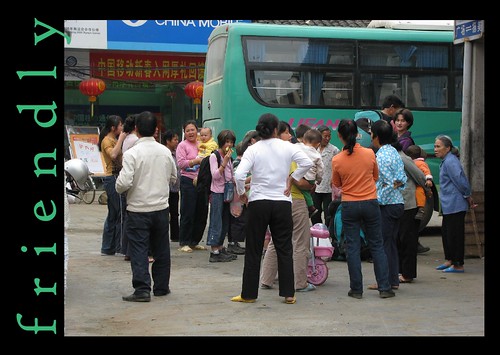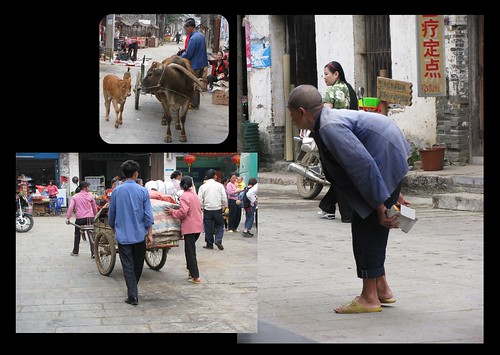what if you don’t understand?
by one who has a BA in linguistics & is married to one who has his masters in the same, applied
Yangmei – Nanning, China
Standing in a queue at the Cambodia/Vietnamese border, we were chatting with a Vietnamese man. We asked him how to say, “Thank you” in Vietnamese and he looked horrified.
“How can you travel in Vietnam if you don’t speak the language?” he genuinely enquired. We hadn’t really thought about that!
Not many people spoke English, but we managed.
Fast forward to another border, this time leaving Vietnam. While Rob and I fill out the tedious but necessary customs declarations and immigration forms, the children refresh their Mandarin-tape-memories and try out, “Ni hau”. By the time we leave the immigration building they have also found out how to say…..wait for it…..thank you. No-one looked concerned at them asking this time.
But not many people here speak English. Fewer than Vietnam.
They are, however, much more friendly.
Take today, for instance.
We knew we needed to come back to Nanning and so we wandered up to the town square, which the bus squeezes into, and waited. Within minutes this had happened:

(yes, the are SWARMING around us – can you even see us?)
Did you notice I said the bus squeezes into town? Those town planners in the 1600s did not have busses in mind when they laid out the lanes.

Anyway, we stood for half an hour “discussing” with all these people how many children, their ages, how they are so unbelievably tall (three year olds are routinely smaller than our two year old here), how many boys, how many girls, how old I am, how old husband is…..and I “ask” the same of them. In this way we have learnt the hand signals for six (hold up thumb and little finger), ten (make an x), half (bend your thumb)….we also know ox (it’s a no-brainer, and probably unhelpful anywhere else, but most useful in Yangmei!), sleep (well, that is to say they understood me laying my head on folded hands!), eat, and drink beer (only Rob has had that offer and he’s not sure if it referred to beer or vodka or everything alcoholic)……when people are friendly, you can communicate.
It also helps when whoever-you’re-communicating-with makes an effort to help you understand. And they do that a lot. I have lost count of the number of times in just a few days that people have repeated their sentence over and over and over and over again….and then when I show no recognition, they say it LOUDER and SLOWER. This would be very helpful if I had a rudimentary knowledge of Mandarin, but I’m still at the learn-a-word-or-two-a-day-stage. The only Chinese character I can read is YUAN (brother to our dollar sign), but on half a dozen occasions already the person I’ve been “speaking” with has written down what they are saying to help me. I appreciate the efforts they go to, but I’m totally Chinese-illiterate. I didn’t even get it when one lady wrote her characters a second time, this time BIGGER 😉 I felt small!
So we stumble our way along. Yesterday we had a Polish conversation, just enjoying that we could say more than, “eight children”…and we looked forward to being somewhere where we can jabber away a bit (if it all comes back to us, that is – it’s been seventeen years since we had cause to speak polskiego!)
But for now we are just enjoying making what effort we can to communicate with people, who have welcomed us with the friendliest smiles and wide open arms.

town square this morning while we waited for the bus to fill up
Tags: history, learning, postcard: China, transport




it’s a shame esperanto hasn’t caught on much huh? lol… but didn’t you know that sllooowwlly aannddd LLOOUUUDDLLYY is the *real* international language? 😉
When mum talks to her deaf uncle she also speaks slowly and loudly – it must be an international language for speaking to people who don’t understand you! (Actually mum speaks slowly and loudly to me if I call her on her mobile, and my Japanese friend from school who had excellent english…!!)
I’m certainly guilty of the ‘slowly and loudly’ method!!! On a different matter……what are those green ‘horns’ on the front of the bus for……..to stop you getting too close to the next one??!!
Mrs Ed – I think you may find if you look closely they are the side mirrors!! – maybe they need to be there to help the driver get through the narrow lanes!
Thanks for the clarification, Leigh………now that I take a second looooooooonger look I see that you are so right!!!
Yep, dem be mirrors. Most of them in Vietnam were just broken fibreglass “horns” with mirrors long since broken and gone…. here in China they actually are mirrors. They also don’t seem to use the horn the same as in Vietnam… much more reserved!
Ah, you guys crack me up!! You are so right, they look like horns 🙂 My kids had to look at the photo due to my laughing. I love the loud and slow approach – it really is THE international language. Have caught up on your adventures after a week off. Boy, you fellas fit a lot into a day 🙂 Loving the adventure stories. Wonderful narrations of it all too. But, are the children learning anything – what about their schoolwork? Hahaha! Had to throw it in! Peace to you and your. Maybe we could find a Babel-fish for you ….